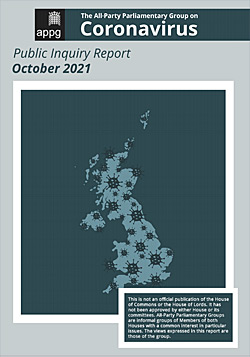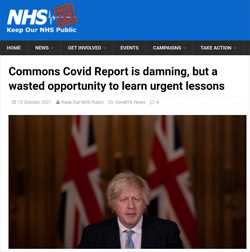 |
|
|
|
In reality the Report blames every one else, but the Government! The select committees, Health and Social Care, and the Science and Technology Committees have issued a repor tinto the way in which Government handled the Coronavirus pandemic in the UK. In reading the report, it is clear that none of the relatives of the victims of Covid-19, or surviving patients; were aksed to give evidence to the select committee. Had they been asked to, the fiondings of the review into the handling of the pandemic, may have been somewhat more critical. The full 145 page report is available to download from the Unionsafety E-Library here using searchword 'Covid' in the category of 'Government Reports'. The conclusions of the report are as follows: (Paragraph numbers retained for clarity when referring to the original document)
Nevertheless, some useful lessons were learned and applied, such as the drafting of legislative measures that might be needed. 60. The operation of COBR was not well-suited to the modern demands of a pandemic response. It is especially concerning that its culture of confidentiality was considered by some to be so unreliable that alternative meetings were arranged that could command greater confidentiality among participants. 61. The Civil Contingencies Secretariat did not have adequate resources to maintain a substantial standing capability to survey the development of potential threats, and it had a limited reach into the range of Government departments required to respond to a pandemic. The experience has been that this investment in resilience is at risk of being trumped by the day-to-day pressures of Government. 62. Protocols to share data between public bodies involved in the response were too slow to establish and to become functional. This was especially true in the data flows from national to local government. 63. The NHS responded quickly and strongly to the demands of the pandemic, but compared to other health systems it “runs hot”—with little spare capacity built in to cope with sudden and unexpected surges of demand such as in a pandemic. The general view of this report is that it is a whitewash and does not go into enough detail about the serious errors made by the Prime Minister, the Cabinet and SAGE. Meanwhile more clarity on the true nature of the failings of Government in dealing with the pandemic may well be available when the report from the Keep Our NHS Public (KONP) campaigtn group which did interview everyone affected, pateints, families of those losing their lives to Covid-19, clinicians and nursing staff; is finally published later this month. It was launched at a press conference on 7th July, but despite journalists from the mainstream media being ppresent, it was never actually covered in any depth, but neither has anything to do with the Government's response to any public health issues, and merely repeat Downing Street press sstatements. KNOP have issued a response to the select committees report which makes clear their disatisfaction with the report's findings: 'The House of Commons Health and Social Care, and Science and Technology Committees joint report Coronavirus: lessons learned to date was published 12 October. Despite outlining some mistakes in the Government’s early response, which will surprise next to no one, the report and the spin on it rests most of the blame on public health bodies rather than the Government, and of course Prime Minister Boris Johnson gets off almost scot-free.' 'Despite being critical of aspects of the Government’s response the report is nonetheless a whitewash covering up the worst political failures of this Government. The two chairs are Conservative MP Jeremy Hunt, who served as Health Secretary from 2012 to 2018, and Conservative MP Greg Clark.' But perhaos the most damning aspect of the report is in the fact that the co-author Jeremy Hunt, was also the person responsible for the errors and chaos and lack of proper planning prior to the pandemic hitting the UK: 'As the reports’ co-lead Jeremy Hunt is predictably providing cover for his own role in the years leading up to the pandemic. As Secretary of State for Health, Hunt sank the NHS into a crisis which left it and the population totally exposed when the pandemic arrived – leaving the problems of insufficient staff (100,000 hospital vacancies and a shortage of over 7000 GPs), a lack of hospital beds and equipment, insufficient ventilators, crumbling NHS estate, depleted public health and low morale. He also failed to act on the pandemic planning Exercise Cygnus 2016 and claims not to have even been aware of the Exercise Alice, also in 2016, into coronavirus pandemic planning. All explained away neatly: Source: Government website / KNOP / People's Covid Inquiry website See also: Peoples Covid Inquiry Preliminary Findings
|


